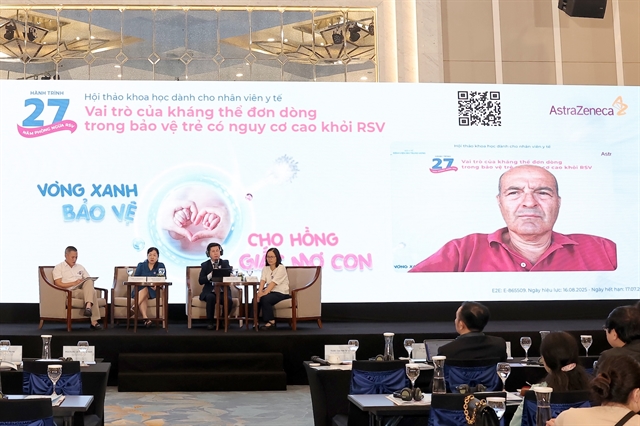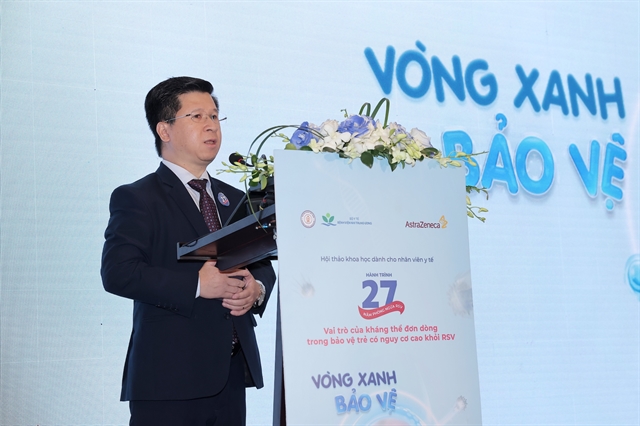 Society
Society


|
| The first immunoprophylaxis solution for respiratory syncytial virus in protecting high-risk children from lower respiratory tract infections being rolled out in Việt Nam at a scientific symposium in Hà Nội on August 16. — Photo Courtesy of the organisers |
HÀ NỘI — The immunoprophylaxis solution for respiratory syncytial virus has been introduced for the first time in Việt Nam, opening a new chapter in protecting high-risk children from lower respiratory tract infections.
The breakthrough was announced at a scientific symposium jointly held in Hà Nội last week by the Việt Nam Paediatric Association, in collaboration with AstraZeneca Vietnam, under the theme “27 Years of RSV Prevention – The Role of Monoclonal Antibodies in Protecting High-Risk Children from RSV”.
The event, also held online, attracted more than 700 attendees, including leading Vietnamese and foreign paediatric experts.
It provided a platform to share global and national data on RSV, update clinical practices, and highlight a pioneering approach to preventing LRTI in high-risk paediatric groups.
Cao Việt Tùng, deputy director of the National Paediatric Hospital, hailed the development as “a major breakthrough in paediatric medicine”.
Clinically proven worldwide for nearly three decades, the method not only protects high-risk children effectively but also opens a new direction for proactive prevention of serious respiratory diseases in young children, he said.
“Its widespread adoption will reduce the burden on families and the healthcare system, while giving children the opportunity to grow and thrive in good health.”
The National Paediatric Hospital is among the first public hospitals in Việt Nam to adopt the method.
According to the hospital’s board, nearly 300 premature and high-risk infants across 30 hospitals in 10 provinces and cities have already received the therapy, showing positive outcomes with no adverse reactions reported.
RSV is one of the most common causes of hospitalisation among infants, particularly those under one month old, due to their immature immune systems and small, fragile airways.
Global studies estimate RSV leads to more than 3 million hospitalisations and nearly 60,000 deaths annually among children under five.
The virus accounts for over 80 per cent of acute lower respiratory tract infections in infants under one year old.
Premature infants face especially high risks, with hospitalisation rates rising commensurately with the earlier a baby is born.
Children with congenital heart disease are 2.7 to five times more likely to be hospitalised due to RSV, while those with bronchopulmonary dysplasia face risks up to 20 times higher.
These figures highlight both the threat to children’s health and the immense strain RSV places on healthcare systems.

|
| Cao Việt Tùng, deputy director of the National Pediatric Hospital, speaks at the scientific symposium. — Photo Courtesy of the organisers |
The newly introduced immunoprophylaxis uses recombinant monoclonal antibodies to block viral fusion and replication, preventing RSV from spreading within the respiratory system.
Used in more than 100 countries for nearly 30 years, it is now officially available in Việt Nam to protect high-risk groups such as premature infants and children with chronic lung disease and congenital heart conditions.
Earlier this year AstraZeneca and the National Paediatric Hospital also organised a scientific session on RSV prevention, which attracted broad participation from paediatric, obstetric and general hospitals nationwide.
It updated clinicians on advanced international strategies to mitigate RSV’s impact in Việt Nam.
Health experts recommend administering monoclonal antibody prophylaxis to premature infants under six months of age and children under two with congenital heart disease or chronic lung conditions, particularly before or during RSV season.
Unlike vaccines, the therapy provides immediate and sustained protection without requiring the body to build natural immunity.
The introduction of this method is expected to significantly reduce RSV-related mortality, ease hospital pressures and improve the quality of life for vulnerable children.
“This is not just about treatment—it is about prevention, and prevention is always better than cure,” Tùng said.
With nationwide implementation supported by paediatric hospitals and AstraZeneca, experts believe the therapy will play a vital role in giving the country’s youngest citizens a healthier start in life and reducing the burden of one of the leading causes of childhood respiratory illness. — VNS




